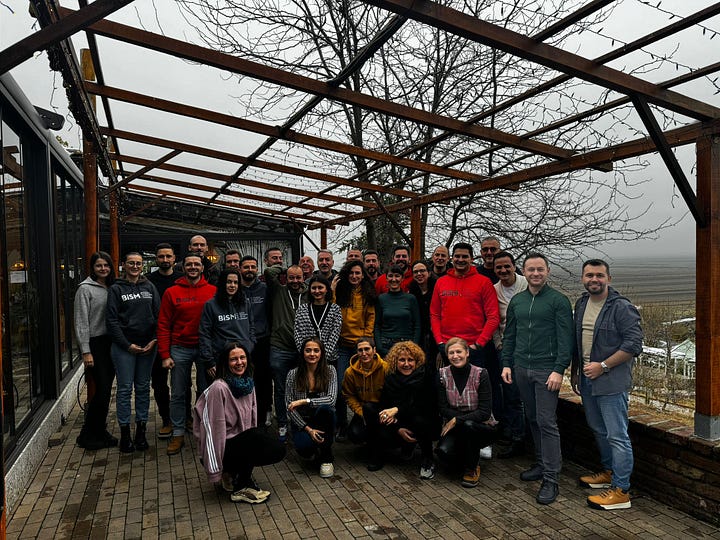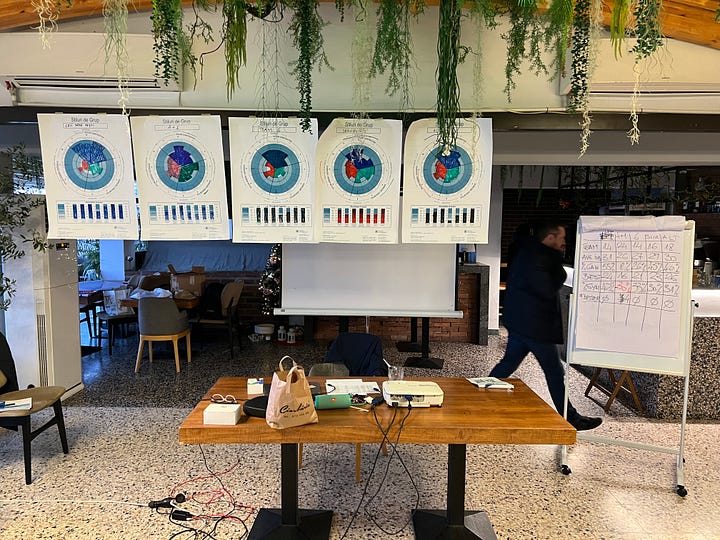#35: The Beginning of an Exciting Journey
And the importance of personal and organisational values
Hey friends,
There are only 14 days until Christmas, but I’m already in the holiday spirit as I’m writing this newsletter while looking at the Christmas tree (not decorated yet) and listening to the “Classical Christmas” playlist on Spotify.
Before vacation, though, it’s the end of the year, and many of us have a busy schedule at work, so let’s give it one last push before we can relax with some mulled wine or hot chocolate.
1/ A few updates from my side.
I spent the first couple of days last week still in Sweden, taking long walks in the forest or enjoying the Christmas lights downtown.
We’ve also been to a “lights festival” in a big park, and it was very cute. But it was also cold as hell.



It was great spending the short holiday with our friends, especially with this very special friend.
I miss her already!
More important, though, is that this weekend I started the MBA program with a Discovery Camp around Bucharest.
It was a great opportunity to get to know each other, have some fun, and especially learn some things about ourselves.




And we did this with the help of the “life styles inventory” test, which is a development tool that identifies our thinking and behavioral styles and gives us suggestions for improvement.
I strongly encourage you to check it out and do it for yourself. I won’t share my results here, but I had some surprising and even eye-opening results.
For example, while I consider myself a quite competitive person, it seems I am more than "quite.”
A lot of people think that an MBA is not worth it. That it’s expensive, that it’s no longer relevant, or that you can just study the subjects by yourself.
While these might be true, I can tell you for sure that more than 50% of an MBA’s worth is about networking.
This weekend, I’ve met so many people from so many industries and in different roles that it would have been almost impossible to meet them in another setting.
Seeing all these perspectives and ways of dealing with specific situations made me realize that we lose so much by surrounding ourselves only with people from our organization or with friends who have similar interests.
There is so much beauty and value in stepping into the unknown.
I’m very excited about the program, and we go full speed this weekend with the “Accounting” module.
2/ The power of values
In today’s world, we are so often caught up in operational tasks that we forget why we are doing what we are doing.
This weekend, I was reminded about how important values are in our personal lives and, equally, in our organizations.
First, let’s look at personal values.
Personal values are the principles that define who we are at our core.
They influence our decisions, shape our goals, and reflect what we prioritize in life.
The only way we can live a life of purpose and fulfillment is if these values are aligned with our actions.
Consider integrity, a value that compels us to act honestly and uphold our moral principles.
Or compassion, which drives us to empathize with and support others.
Perseverance inspires us to overcome challenges and pursue our goals relentlessly.
Other examples of values:
Courage: Facing challenges boldly and standing up for beliefs.
Responsibility: Being accountable for one's actions and commitments.
Gratitude: Appreciating what one has and acknowledging the contributions of others.
Fairness: Striving for justice and equality.
Generosity: Willingness to give time, energy, or resources to help others.
Of course, there are more, these are just examples.
But how do you identify your personal values?
To identify your values:
Reflect on the moments you felt happiest or most proud.
Self-assess to understand what these moments reveal about your values.
Prioritize your values to understand which are non-negotiable.
Another important aspect is to revisit these values from time to time. Because, contrary to belief, they might change.
And they usually change as a result of an important change in your life.
That’s why I advise everyone to go through this every 6 months, or every 12 months, as a bare minimum.
Take some time to go over your values, see if they are still relevant, and, most importantly, reflect on your past actions. This way, you can see if what you are doing on a day-to-day basis is aligned with your core values.
Organizational Values
In an organization, values are the bedrock of culture, influencing decision-making and strategy.
They're essential for building a cohesive, purpose-driven workforce and achieving long-term success.
Companies like Patagonia, with their commitment to environmental sustainability, exemplify how strong values can shape corporate identity and consumer trust.
In contrast, organizations with misaligned values often face challenges like high employee turnover and public mistrust.
Establishing and Promoting Organizational Values
To establish values in your organization:
Engage with employees at all levels to define core values.
Implement these values in every aspect of your business operations.
Promote a culture that embodies these values daily.
Aligning Personal and Organizational Values
One of the main reasons why people are unhappy and disengaged at work is that their values don’t align with the organizational values.
Or, as it’s often the case, because the actions that are taken or have to be taken are not consistent with what the organization states as being a value.
In short, this happens when an organization’s values are just some words on a wall.
For individuals, seek out organizations that resonate with your values.
Leaders should strive to create environments that attract and retain individuals whose values align with those of the organization. And, most importantly, make sure the company’s values are not just buzzwords meant to attract candidates but real beliefs that are enforced daily.
Do you know what your values are? Are you acting accordingly?
If not, take some time in the next few days to define them.
It might change your life.
3/ Recommendations: Todoist
I’ve tried so many productivity apps in my life that I’ve lost count. But the one that is best for me at the moment is Todoist.
You can have your projects and tasks in many formats and apps. From pen and paper to Google Calendar or Outlook tasks.
I’ve worked a lot with Notion in this regard. Notion is probably the most complex tool for personal productivity out there, as it relies on powerful databases to keep track of your life and work areas.
I had to move from Notion for now because of two things Todoist is better at:
how easy it is to add tasks
natural language
And these are probably the most important things you should look for when selecting a task manager.
And, of course, cloud sync, but each tool has this at the moment.
With Todoist, it’s very easy to add a task. On my phone, I have a widget that lets me add a task in 3 seconds.
On my Mac, I have a keyboard shortcut that will add a task even faster, regardless if I’m in the app or not.
The second thing that made me switch to Todoist is the natural language processing feature, which is very reliable.
What does that mean? It means that I can set the due date and other parameters of a task by writing them down.
“Set up a doctor’s appointment tomorrow at 2 pm” → will create a task with a due date and reminder at 2 pm
“Check my investments every first Monday of the month.” → will create a recurring task for this based on the information.
These are both very important because many things come to our attention every day, and if it takes too long to jot them down, we will just say we’ll do it later.
And then we forget about them.
Todoist has a free version, which is quite limited, but you can try it to get a hang of it. Go to todoist.com.
Thank you for reading, and let me know if you liked something in particular in this newsletter.
Until next time,
Leo
P.S.: If you would like to read my content daily, don’t forget to follow me on Twitter and Linkedin.
P.S. 2: If you want to take your productivity to the next level, check out my extensive Productivity course that can accelerate your career.


